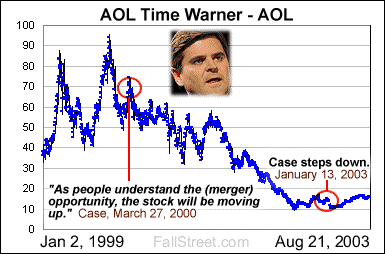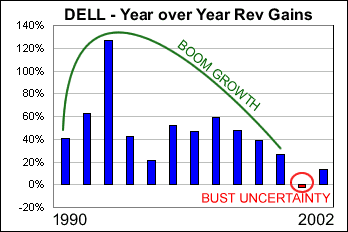August 22, 2003
No New Paradigm Until The Old is Sucked Dry
Whether or not ‘it’ is molecular computers chips, nanobots, or something else entirely, there will undoubtedly be another tech led boom that usurps the Internet. Such a boom will forever change the way people live…
However, for investor’s that dare not risk dalliance in the prophetic arts, what is currently worth remembering is that the Internet/PC led boom - like the light bulb, the locomotive, and the automobile did before it – has already downloaded into bust mode. And as boom turns to bust, invariably a slower moving portrait unfolds.
With this in mind, consider what former AOL boss, Steve Case, had to say about the future of Silicon Valley in a recent Business Week Interview:
“Silicon Valley will continue to be a beacon for a lot of people interested in technology and will continue to have robust growth. It has been through many of these cycles -- of PCs coming on strong and then slowing down, software coming on strong and then slowing down, the Internet coming on strong and then slowing down.
People who have been around a while know this is just another cycle.”
Who are these ‘people’ that have been ‘around awhile’ Mr. Chase? Are these the same people who worked in Silicon Valley for two decades only to lose their job when doubling CPU speeds no longer meant doubling revenues? Are these the same people who accumulated millions of dollars in paper wealth – during the first and only stock options superboom in US history – only to lose it all when investor’s figured out that escalating inventories meant declining margins? Or are these people simply the ever optimistic Execs that go to insane lengths (WiFi is coming!) to try and point to something, anything, that might be the next boom-enabler?
Perhaps the better question is who is Steve Case?
 |
Boom versus Cyclical Growth
To better explain the difference between boom and cyclical growth a simple example will suffice. During the late 1990s, enticed by ‘it’ all, I purchased a then top of the line 166 MHz HP system for more than $5000 (CND). Less than six months later – or when the 233 MHz chip ruled the day – the exact same system I purchased was selling for less than $3500. At this moment I knew, as did everyone else, that the tech/internet age was something special. Why? Because consumers and businesses were continually being told that speed enabled them to do so much more -- they believed this and were willing to pay anything for it.
Flash forward to today: the second largest PC company in the world, Hewlett Packard, is losing money selling PCs, the largest PC company, DELL, is hacking prices lower to try and go for HP’s jugular, and yet CPU speeds continue to escalate (handily above the 2,000 MHz (2 GHz) barrier today). What gives? Can’t a faster, hipper something-or-other bring back the good old days of escalating margins and emptying store shelves?
The answer, of course, is no. Rather, cyclical growth is entirely different than boom growth: BOOM growth carries with it unprecedented growth rates, a seemingly endless supply of investor euphoria, and overinvestment (malinvestment), while CYCLICAL growth is marked by slower/unpredictable growth rates, off and on investor excitement, and more calculating business investments.
Why does boom growth lead to investor euphoria and overinvestment in the first place?
Because people are eager to pay any price for life changing products/services and, in turn, investor’s are willing to pay any price for any company that offers these products/services.
Why is cyclical growth entirely different?
Because my refrigerator ordering me groceries and having any movie ever made at my I-connected finger tips is simply a variation (add on) of the original life changing product/service. While mildly fascinated by some of these products and services, I am not willing to pay any price.
The Fascinating Automobile
While it is certainly possible that something tech related will catch the attention of customers and provide a brief upshot to corporate profits, it is nonetheless clear that many customers are satisfied with the tech components they are driving. Furthermore, it should be remembered that Corporate America just spent more than a decade leveraging and/or stuffing their balance sheets with goodwill (or all the questionable ‘assets’ juxtaposed to that of corporate liabilities), and that the US consumer just finished celebrating a recession by applying for some new credit cards and refinancing their home 20-times. Point being, not only are many potential tech product chasers not as willing to buy new products as they were during the 1990s, many are also not as financially able to buy new products.
A similar phenomenon unfolded more than 70-years ago, or when automobile sales in 1929 began to falter following the Great Crash. By 1933 – even after thousands of automobile companies had already went bankrupt - few people could have predicted that it would take nearly 20-years for car and truck production to reach 1929 levels. Are investors, still fascinated by tech stocks, not recognizing that similar pitfalls may be ahead for today’s Internet/tech kingpins?
The Ongoing, Unprecedented Bust Cycle
When tech companies are going for each others jugulars blood will be shed, and there is nothing today’s indebted consumers and businesses can do to bring back the BOOM until their bust (deleveraging) is complete.
Such is why Mr. Chase’s comment - ‘just another cycle’ – is shocking. I guess he doesn’t realize that many people won’t pay a dime for Wifi until some near profitless competitor makes it affordable, that the hydrogen paradigm is forever being crushed by big oil, that most neighborhoods have yet to see a segway, and that when nanobots are making everything no one is going to be earning a paycheck to buy anything (the current productivity paradox). Mr. Case doesn’t realize that the 1990s tech boom – in PCs, software, storage, the internet, etc. - was a pervasive boom that rippled through the U.S. economy, stock markets, and monetary system.
‘It’ was made possible because stocks started off at depressed levels (1982) and the American public swarmed into 401Ks, PCs became as coveted as pencils and pens, the Fed beat inflation (Volcker/Greenspan), corporations grossly manipulated earnings (ongoing), foreign capital believed the U.S. was crisis proof (Asia Crisis), nothing geopolitically terrible happened, consumers craved more debt, etc, etc.
‘People who have been around a while know this is just another cycle’?
Wrong. Anyone who was around during the last two decades knows the technology led boom was anything but just another cycle. The boom happened because the stars aligned, and the ongoing bust is being prolonged as tiny booms (i.e. housing and the twin deficits) attempt to cushion the fall.
Conclusions
The next tech led boom will arrive when something comes along that forever changes the way people live. This overly simplified statement touted by former visionaries like Case does not comment on the roadblocks in front of the next life altering tech change. To be sure, new paradigms can create powerful monopoly like forces that have a vested interest in keeping new ideas from flowering. For example, has a marriage between Big Oil and the Big 3 somehow convinced a nation to drive gas guzzling SUVs while permanently relegating the Ballard’s to the pipe-dream industry?
Capacity utilization in chip factories rose to 85.9 percent in the second quarter from 82.8 percent in the previous three months, and Intel CEO, Craig Barrett, is still optimistic that PC sales are going to recover strongly. Are we amidst a new BOOM in tech? Definitely not. A cyclical/temporary recovery? Possibly. Why is a cyclical recovery possible? Well, in 1934 US production of cars and trucks had slipped by 75% from their 1929 peak of 5.5 million, yet roadways are still jammed with many millions of combustible engines today.
* Just because tech companies are battling and tech customers are no longer throwing money around, this does not mean that the Internet/PC industry is dead.
However, what should also be remembered is that just because tech is recovering this does not mean that growth will mirror the 1990s. For certain, instead of hundreds of tiny DELL’s selling PCs, rigging EPS releases, and creating imaginary stock market profits for investors, today there is just DELL: stifling the competition and growing at less than boom rates.
 |
Furthermore, as the Microsoft’s pay dividends, the AOL’s delete billions from their balance sheets, and second tier companies (AMD, GTW) use any recovery to simply ensure survival, one can readily see that cyclical recoveries are not true ‘booms’. Quite frankly, the next boom leaders can not be the 100-pound gorillas every tech investor already owns shares in. Why? Because, by definition, these companies have already boomed and are now trying to solidify marketshare by cutting prices, outsourcing employees, and setting up camp in Asia. What these companies are not doing is raising prices to whatever they feel like because consumers are endlessly prepared to buy.
Accordingly, it will take a new collection of yet to be named companies bringing a new contagion of products and services to the public for the next boom to transpire. Of course, this prophecy will not come to pass until the public is financially ready to accept a lifestyle change and/or the gorillas fail at setting up monopoly like forces to protect the ‘old’ from losing sales to the ‘new’. And although it may be a stretch to suggest that the Internet/PC revolution is getting old, I think I would be more fascinated by attending a car show rather than by burning a CD, gazing at a liquid display monitor, or ordering another piece of merchandise online…
In short, Tech America – playing off of more calculating customers – opts to cyclically suck the current paradigm dry; not wishing to embrace the risk that goes along with trying to reinvent the world. The Case’s may blow hard, but their words alone do not a new boom/bubble make.
a